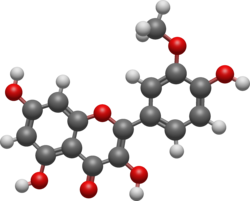Top Qs
Timeline
Chat
Perspective
Isorhamnetin
Chemical compound From Wikipedia, the free encyclopedia
Remove ads
Isorhamnetin is an O-methylated flavon-ol from the class of flavonoids. A common food source of this 3'-methoxylated derivative of quercetin and its glucoside conjugates are pungent yellow or red onions, in which it is a minor pigment, quercetin-3,4'-diglucoside and quercetin-4'-glucoside and the aglycone quercetin being the major pigments.[1] Pears, olive oil, wine and tomato sauce are rich in isorhamnetin.[2] Almond skin is a rich source of isorhamnetin-3-O-rutinoside and isorhamnetin-3-O-glucoside, in some cultivars they comprise 75% of the polyphenol content, the total of which can exceed 10 mg/100 gram almond.[3] Others sources include the spice, herbal medicinal[4] and psychoactive Mexican tarragon (Tagetes lucida), which is described as accumulating isorhamnetin and its 7-O-glucoside derivate.[5] Nopal (Opuntia ficus-indica (L.)) is also a good source of isorhamnetin, which can be extracted by supercritical fluid extraction assisted by enzymes.[6]
Remove ads
Metabolism
The enzyme quercetin 3-O-methyltransferase uses S-adenosyl methionine and quercetin to produce S-adenosylhomocysteine and isorhamnetin.
The enzyme 3-methylquercetin 7-O-methyltransferase uses S-adenosyl methionine and 5,7,3',4'-tetrahydroxy-3-methoxyflavone (isorhamnetin) to produce S-adenosylhomocysteine and 5,3',4'-trihydroxy-3,7-dimethoxyflavone (rhamnazin).
Glycosides
- Isorhamnetin-3-O-rutinoside-7-O-glucoside
- Isorhamnetin-3-O-rutinoside-4'-O-glucoside
- Narcissin (Isorhamnetin-3-O-rutinoside)
See also
- List of antioxidants in food
- List of phytochemicals in food
- Tamarixetin, the 4'-methyl analog
References
External links
Wikiwand - on
Seamless Wikipedia browsing. On steroids.
Remove ads


